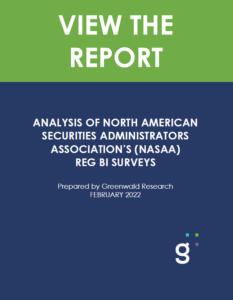Washington, DC, February 25, 2022 – Greenwald Research (Greenwald), a leading independent custom research and consulting partner to the health and wealth industries, released new industry research from The Role of Work-Life Balance & Benefits in The Great Resignation Survey. The research shares the attitudes and motivations that are influencing Workers’ decisions to leave the workforce or change their employment status.
Greenwald’s quick-hit survey on The Great Resignation, found that a third of Workers say they made a job change in 2021, and an even larger share — closer to 4 in 10 – plan to make a job change in 2022. The groups most likely to have made a change or plan to make a change are contractors/gig workers, younger Workers (under 50 years of age), Black Workers, and Hispanic Workers.
Powered by response:AI, The Role of Work-Life Balance & Benefits in The Great Resignation Survey was conducted in January 2022. It explored the reasons why American workers were making or considering job changes and the role that traditional and emerging benefits play in these decisions.
Current Climate
Over the past year, 30% say their overall job satisfaction has improved, while 25% say it has declined. In their current jobs, workers are most satisfied with the relationships with colleagues and managers. While most are still satisfied, many employee benefits, including mental health resources, disability insurance offerings, supplemental health insurance, are lower on the list. Also, though 55% of current workers are satisfied with their pay, 26% say they are dissatisfied. This represents the highest level of dissatisfaction among the job aspects surveyed.
Reasons for Making an Employment Change
Workers who changed their employment in 2021 or plan to in 2022 provide a variety of reasons for making the switch. Aside from pandemic-related reasons, workers most often say their changes are a result of not feeling valued as an employee, experiencing burnout, or looking for greater work-life balance, including more flexible working hours, a better company culture, or remote work opportunities.
Pay
53% of Workers who made a change in 2021 say dissatisfaction with pay was a reason (major or minor) as to why they made a change. Of those who changed jobs, 45% say their base pay is higher than their previous job. However, for those looking to make a change in 2022, two-thirds are planning to do so because they are unhappy with their pay. Since roughly a quarter of respondents either express that having enough money to pay the bills (25%) or to pay off debt (23%) is their biggest source of stress, pay is clearly extremely important to consumers.
Work-Life Balance and Remote Work
More than half of those who made a change in 2021 did so because they were feeling burnt-out (57%), wanted more flexible work hours (55%), or wanted to work remotely (52%). More than four in ten who made a change did so because they needed more time to provide childcare (45%) or needed to care for an adult family member (42%). Nearly six in ten who made or are expecting a job change say working for an employer that understands the needs of working parents is important.
Remote work is an important employment consideration for many workers. Of workers who worked remotely at some point during the pandemic, four in five would like the option to do so at least part-time moving forward (80%).
Company Culture
54% of those who made an employment change in 2021 and 46% of those planning to make a change in 2022 say the company culture was not a good fit for them. Two-thirds say that culture is important when considering an employment change.
The top reason Workers left their jobs in 2021 was that they did not feel valued as an employee (59%). Half left their job in 2021 to pursue more professional growth, and of those planning to leave their job in 2022, at least half do not feel valued at their job or want to make a change for professional growth.
Benefits
More than four in ten workers who changed employment in 2021 or plan to in 2022 cite being unhappy with their employee benefits or allotted PTO.
More than six in ten who made a change deem benefits other than health insurance important when considering an employment change. Such benefits include mental health and wellness benefits, health insurance, vision insurance, PTO, dental insurance, and retirement plans.
Significant portions, although less than half, consider health insurance, life insurance, disability insurance, and dependent coverage important when evaluating employment changes. In their new jobs, 44% of survey respondents are happier with the variety of benefit options, and 43% are happier with the amount of PTO available to them.
Effects of the Pandemic
The pandemic played a part in sparking the desire for change. A large share of workers decided to expedite their plans to make an employment change, either in 2021 or planned for 2022, as a result of the COVID-19 pandemic, especially those under 50 years old and those with full-time jobs.
Nearly six in ten cite the pandemic as a major or minor reason in causing them to feel like they needed an employment change. 53% say they were scared to contract COVID-19 at their jobs, and 48% were unhappy with their employer’s COVID-related policies.
For those planning on making a change in 2022, 61% say the pandemic inspired their need for change. Slightly fewer, however, are scared to contract COVID at work (47%) or are unhappy with their workplace COVID-19 policies (42%).
What Would Make Employees Stay with Their Current Employer?
Those who either left a job or retired generally say their employer could not have done anything to make them want to stay. The most common themes mentioned include respect, organizational structure, physical space, and the need for better pay. Among those who plan to make an employment change in 2022, opinions are more split. Some respondents say better pay could make them stay, while others say there is nothing that can be done.
Only one in ten (11%) think better benefits could entice them to stay.
“Many of the drivers of job change are within the control of employers, such as culture, work-life flexibility, and pay,” says Greg Hershberger, Managing Director of Health & Benefits at Greenwald. “We wanted to know if traditional or newer employee benefit or insurance offerings could make a difference. While traditional benefits remain important in these decisions, it doesn’t appear the main challenges to retention can be solved by more insurance offerings at work.”
When asked about what emerging benefits are most motivating to employees, roughly seven in ten cite more flexible work schedules, a signing or retention bonus, the ability to retire gradually, unlimited PTO, or remote work as being at least somewhat impactful in a decision to stay with a current employer or move to a new one.
With the changing professional landscape sparked by the pandemic, employers now have a unique opportunity to take a fresh look at their compensation, benefits, and work-life balance structures to build an even more attractive environment for job-seeking Workers or to increase their current workforce’s satisfaction.
About the Research
Greenwald’s The Role of Work-Life Balance & Benefits in The Great Resignation Survey, powered by the response:AI platform, is an online survey exploring Workers’ motivations behind recent workforce changes and the role of benefits and work-life balance on those decisions. The survey was conducted from January 7 to January 18, 2022. Consumers were required to be ages 25 to 74 and must have been currently working or made employment changes in 2021 or planned to do so in 2022. The survey included 1,206 respondents.
The full results of The Role of Work-Life Balance & Benefits in The Great Resignation Survey are available for purchase. Contact Greenwald Research to learn more.
About Greenwald Research
Greenwald Research is a leading independent custom research and consulting partner to the health and wealth industries that applies creative quantitative and qualitative methods to produce knowledge that helps companies stay competitive and navigate industry change. Visit greenwaldresearch.com to learn more.
Contact:
Greg Hershberger
Managing Director, Health & Benefits
Greenwald Research
Greghershberger@greenwaldresearch.com
(202) 686-0300
###















